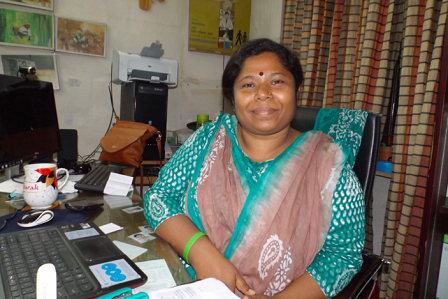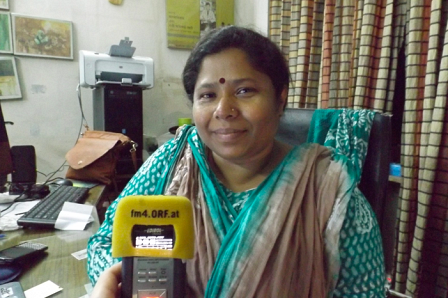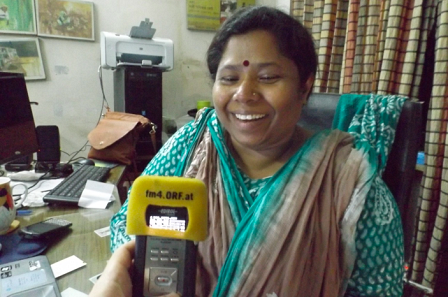Erstellt am: 27. 3. 2015 - 16:30 Uhr
Kalpona's Story: Fireburned to firebrand
Reality Check Special
Listen to a Reality Check Special with Johnny Bliss in an informal chat with the former garment worker-turned labour activist, Kalpona Akter.
Saturday, March 28th, 12-13, and afterwards seven days on demand.
Over the past year or so, I've had the privilege of making the acquaintance of a great many brave and inspiring people; these included Reykjavik mayor Jón Gnarr, British physicist Stephen Hawking, and many other less famous (but nevertheless amazing) unsung heroic individuals, who'd faced down tremendous obstacles to achieve success in their own journeys.
One of those people is Kalpona Akter.

Johnny Bliss, 2014
Special thanks are due to Ines Zanella from Südwind, without whose 'hot tip' I never would have had the opportunity to meet Kalpona Akter, let alone written this article, or made this program.
I met Kalpona in the capital city of Dhaka, at the end of a month's trip through her home country of Bangladesh. From the Sundarbans in the south, all the way to the far northern border communities, I'd toured the region extensively. There were limitations, however, to what I could see, passing through this country as an outsider.
While locals I'd met had been generally friendly, chance meetings with the ones who could speak English were a rare luxury. Being unable to understand most of their stories, merely bear witness abstractly to their poverty and poor health, left many holes in my understanding of what it must really be like to live and work in a country like Bangladesh.
So when an acquaintance from an Austrian nonprofit organization forwarded me the contact information of Miss Kalpona Akter, in an e-mail shortly before the end of my journey, I frankly jumped at the opportunity to meet this person.
* eerily reminiscent of the fatal fire that killed many, at the Rana Plaza factory building in Savar in 2013.
Here's what I knew about Kalpona, ahead of meeting her in her office on the outskirts of Dhaka: She was a former child garment worker in Bangladesh's thriving (but exploitative) textile industry; she had herself been victim of a factory accident* and survived; since then, she had learned her legal rights as a worker, and gotten blacklisted as a result of demanding access to them; and she was now the Executive Director of a prominent labour rights organization called the Bangladesh Centre for Worker Solidarity, or BCWS.
But what would the actual person be like? How does experiencing all this hardship affect you? I had no idea what to expect. I imagined perhaps an idealogue, a firebrand with a chip on her shoulder, always ready for a fight.
Some of this was true, but not exclusively; the truth was (as it often is) far more complicated. In addition to her defiance and battle instincts, I could detect a great deal of humility, sadness and self-possession. All of this matched her sobering life story to a tee.

Johnny Bliss, 2014
On Being a Garment Worker
"I started working at the age of twelve. I had to do that. That wasn't my choice, to go to the factory. I had to because my father was ill. Then me and my ten years old brother, we went to the factory and worked for hours [to] bring food to the table for seven."
"The sixteen hours shift was pretty common, even I worked 23 days in a row, and had to sleep 2 or 3 hours in the production floor in that time. They would yell on us, slap on us, whenever we'd do minor mistakes."
"No doubt that was [an] unsafe factory."
On Surviving a Factory Accident
"There was a fire in my factory, and I was kept [locked-in] with my co-workers, at the production floor, [with the factory management] saying that the fire will not come downstairs. The fire started in fifth floor, and we were in the third floor. So, it was my question to them like, idiots, how do you know that fire will not come downstairs?"
"So then, we screamed and cried to escape, and finally they opened the door after an hour or so. When we all rushed to escape the building, many of my co-workers had been stampeded. The reason was there was only one stair for over 800 workers, and half of that was blocked by merchandise. Luckily, nobody died, but many of them were injured and many of them were in PTSD (Post-Traumatic Stress Disorder)."

Johnny Bliss, 2014
On Deciding to Strike
"The long hours I had to work, [how much] I was paid during those days, which was six dollars per month, [I accepted all of this] because I didn't know [my legal rights]."
"What I would know is, that these factory owners are so kind, they gave me jobs, so I can feed my family, that was my understanding. So I was even tolerating all this misbehaving, shouting, yelling, because I didn't know how to react. But two or three years later, we went for a strike in our factory, because the management had decided to pay us less [...]. We said 'No, you cannot do that', and we went for a strike."
"The factory management later fired about two dozen of my co-workers who joined in the strike. But they found an organization, where they could get legal support to sue the factory owners: These folks went back to us and said, 'Hey, you should know there is a level of training where you can learn your rights', and one week later, I went there. It was a four-hours long training, which changed my entire life."
On Getting Blacklisted
"I started organizing my co-workers to join the union and to let them know what is the union is. [The factory owners] didn't like that, so they blacklisted me. They gave [my photos and my information] to the other factory owners, so wherever I would go to apply for a job, they just fired me..."
"They made my life miserable, because I couldn't get a job anywhere. Then, the organization, the union, where I learned the law, hired me as a labour educator and union organizer. Since then I never stopped. That was a stupid decision by the factory owners in those days. They thought I am a trouble maker... Yeah, I WAS a trouble maker, but I could just make trouble in the one factory. See what I am doing today!"

Johnny Bliss, 2014
FM4 Reality Check Special on Saturday, March 28th
Listen to a Reality Check Special with Johnny Bliss in an informal chat with the former garment worker-turned labour activist, Kalpona Akter. Saturday, March 28th, 12-13, and afterwards seven days on demand.
If you miss the program, you can still stream it via the Reality Check podcast or at fm4.ORF.at/7tage.


